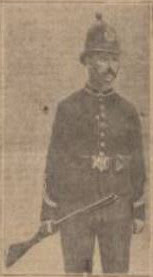Imprisonment with hard labour was often the sentence for people, found guilty by the local courts. I have chosen several examples from the newspapers of 1930, the charges were theft, drunk and disorderly. Quite what hard labour entailed I don’t know, or if there was any other form of imprisonment. The local police tried to keep the area free from “undesirables” and told anyone they considered to be in this category to leave town. All these court cases concern people from outside the local area of Lyme Regis, Bridport, Beaminster and the surrounding villages.
Lyme Servant Sent of Prison
Evelyn Dyer aged 25, from Portsmouth, was given 2 months imprisonment with hard labour by Lyme Regis court. Her crime was stealing cloths and money from her employee in February 1930. Evelyn had only just come out of prison when Mr & Mrs Gooch, from Lyme Regis, employed her as a domestic servant. She hadn’t been with them for very long when Mrs Gooch, gave the women £1 to do some shopping and the temptation was too much for Evelyn.
Wayfarer's Disorderly Conduct
In July the Bridport Bench gave George Williams 21 days imprisonment with hard labour for being drunk and disorderly at Mosterton. Grandad Beck (Supt. Beck) said George a wayfarer, had "almost frightened to death" a women who George accosted. Supt. Beck went on to say
these men, when in drink, were a source of considerable annoyance in the districts they visited. The newspaper headlines were "Pandemonium in Village", George must have caused quite a disturbance before falling asleep on the roadside were P.C. Corbin found him or was it his behaviour on being arrested that caused the “pandemonium”?
Undesirable Visitors At Bridport
Supt. Beck was trying to rid the town (Bridport) of people of no fixed abode who came to the area, Sergt. Richardson told Bridport Borough Magistrates in July. The police had been instructed that such men were not to be allowed to stay in the town. James Connor a wandering musician with his accordion came to Bridport Police station to enquire about playing on the streets. He was told, street playing was not allowed in Bridport but James played anyway. That night he was found drunk by P. C. Blues but when asked to leave the town used
vile language. He was sentenced to 14 days in prison with hard labour for being drunk and disorderly.
Major's Residence Entered Near Lyme Regis
It was not just the homeless who caused problems, in July
four well-dressed men from London came by car to Lyme Regis and were charged with housebreaking. They broke into Major Joseph Seymour Biscoe's house in Content, Lyme Regis stealing jewellery valued at £28 1s. Lyme Regis Magistrates remanded the four to Dorchester where they appeared at Dorchester Quarter Sessions in September. One man was found not guilty but the other three were described by Supt. Beck as
members of a dangerous gang of motor bandits. Fredk. Turner, 56, caterer, was sentenced to 18 months with hard labour. George Kelly, 30, a shoe maker, Chas. Millard 26, motor driver, where each sentenced to 12 months.
It would be good to have the time to find out more about the people and how accurate the newspaper reports were. Did Evelyn ever stop stealing? Did Mr & Mrs Gooch find a new servant? In 1930 finding and keeping domestic servants wasn’t easy, few women wanted this way of life. Did George and James remain homeless, on the road, for the rest of their lives? Who was Major Biscoe and on what occasions did his wife wear her jewellery?
All original content by Sylvia Collins is copyright protected.References Quotes in Italics:
The Devon and Exeter Gazette: 24th February 1930 p6 Col6; 7th July 1930 p8 Col2 The Western Gazette: 4th July 1930 P5 Col 1; 1st August 1930 P16 Col4 The Western Times: 3rd October 1930 p7 Col5


I like all the different examples coming together to make a complete picture
ReplyDeleteA prisoner sentenced to hard labour could be sent to a prison farm, a quarry breaking rocks or pointless labour such as the treadmill. I wonder how many of these men suffered in the First War and couldn't settle to a normal life and ended up on the road and alcoholism. Great uncle Percy Beck certainly worked hard to keep Bridport clear of drunkeness and 'Gentlemen of the road' out of town.
ReplyDeleteThank you for your reply Heather, it is nice to know I someone is reading this! I thought the pointless labour that was used in Victorian times had finished by this time. I found a report from 1928 were the prisoners were sentenced to Penal servitude. More research is needed, but everything I find on the internet is related to pre the first world war.
ReplyDeleteIt amuses me the different attitudes to tramps, not that you see or hear that term now. It is homeless people, who seem to stay in one area, I haven't seen or heard of anyone moving around in the way that they used to.
I also enjoy the language used in these reports, newspaper writing style has changed. Sentences are longer too, my Wordpress software has comments about the sentences being too long when I quote the newspapers.
Thank you for your comment Alison, there are so many interesting quotes in the newspapers to make it really interesting.
ReplyDelete[…] men but by 1930 these men were considered undesirables and should not be allowed to stay in town, as I wrote here. Supt. Beck was trying to rid the town of this particular class of man … and had given […]
ReplyDelete